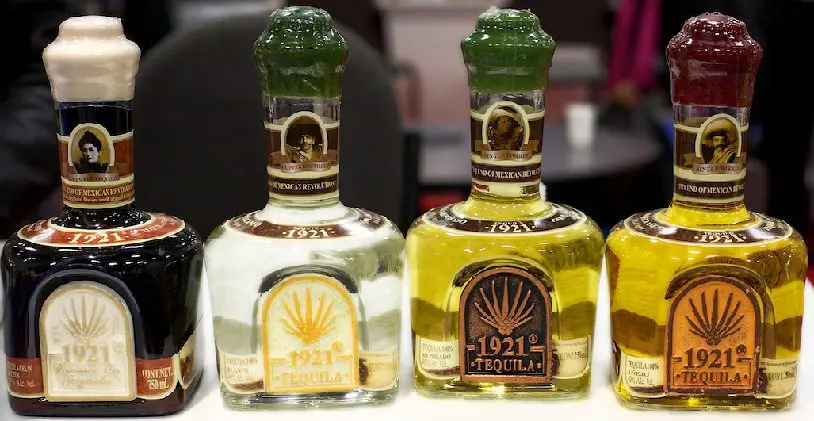Although 1921 tequila consists of 100% blue agave juice, belongs to the premium class and is more expensive than usual, you can not buy it always and everywhere: it is produced in limited quantities. The drink is produced at a small distillery Destileria Morales, located in the city of Arandas.
“1921” was the first tequila in the world to be marked with the “Organic” badge: this means that for its production, environmentally friendly raw materials grown using organic farming technologies are used. Tequila “1921” was awarded medals of the prestigious international competition Agave Spirits Challenge in 2008, 2010 and 2011.
In 1996, “Corporacion Licorera 1910” registered the trademark “1921”: the new tequila was named in honor of the victory of the Mexican Revolution. For the advertising campaign, the brand owners chose the slogan: “This is not tequila, this is history.” The labels of the drink bottles depict portraits of the heroes of the uprising:
- on the label 1921 Blanco – a portrait of a soldier of the revolutionary army;
- on the label of 1921 Reposado is a portrait of a revolutionary woman, one of those who were called La Adelita. Such women looked after the wounded, worked as laundresses, cooks, and sometimes spied for the rebels. The prototype of La Adelita is Adela Perez Velarde, a noble lady who selflessly served as a nurse throughout the war;
- on the label of 1921 Añejo is a portrait of General Emiliano Zapata.
Types of tequila “1921”
Destileria Morales produces three varieties of tequila “1921” with a strength of 40%:
- 1921 Blanco – a colorless young tequila with the smell of agave, meadow grasses and flowers. The taste of the drink is delicate, with citrus hues and a long spicy aftertaste;
- 1921 Reposado is a six-month-aged honey golden tequila with caramel and toasted oak aromas. The taste of the drink harmoniously combines fruity and vanilla tones, emphasizing the spicy sweetness of baked agave. The aftertaste is silky, with a citrus note;
- 1921 Añejo is a dark amber tequila aged for a year in American oak barrels. It smells of honey, fruits and coconuts. Spicy taste with a hint of smoke smoothly turns into a velvety warm aftertaste.

Three types of creamy liqueurs are also produced, with a strength of 15%, based on 1921 Blanco tequila:
- 1921 Crema de Tequila Classica – creamy coffee liqueur with a touch of cinnamon and caramel;
- 1921 Tequila Cream Irresistible Edition Azul Maya;
- 1921 Tequila Cream Irresistible Edition Rosa Mexicano.
Historical reference. The state of Jalisco is the center of tequila production. In the old days, every local estate had at least a small distillery, where they drove tequila according to special family recipes passed down from father to son.
In 1926, the Mexican government issued decrees against the church and wealthy landowners. In the state of Jalisco, a Cristeros uprising broke out, troops were sent to pacify it. The soldiers arrested the landlords involved in the rebellion (and there were a majority of them), and they could not do without looting. Priests and owners of haciendas hid the most valuable property as best they could.
In the early 90s, workers renovating the old Hasienda La Colorado estate discovered a secret passage that led them to a wine cellar. Here, in perfect order, carefully packed and protected from moisture, chests with gold coins, silverware and church utensils stood between tequila casks. The tequila was over 60 years old.
Representatives of the company “Corporacion Licorera 1910 SA de CV” became interested in the discovery. Together with the Destileria Morales tequilero, they researched a drink that tasted amazing and tried to recreate its recipe. This took several years. The taste of tequila is influenced by many factors: the time of roasting and fermentation of raw materials, the type of yeast, the material from which the alembic is made, and even the fertilizers that were used to feed the piñas (“agave cones”) during the ripening period.
In the production of a replica of old tequila, all mechanization had to be completely abandoned. The drink is made from agave, which is not treated with any pesticides, and only organic fertilizers are used. At Destileria Morales, cut piñas are simmered in ancient clay ovens for 72 hours, just as they did in the XNUMXth century. The fermented juice is distilled twice in copper stills.









